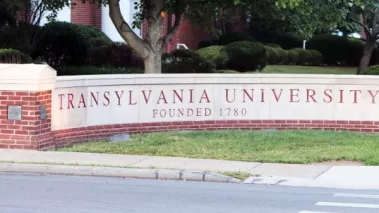Table of Contents
FIRE to Transylvania U.: Treat students equally and abandon your free speech zone

Transylvania University. (James R. Martin/Shutterstock.com)
A couple weeks ago, members of Transylvania University’s Young Democratic Socialists of America did what thousands of college students do every day: They set up a table outside and talked to their fellow students about what they believe in.
After about ninety minutes, they packed up.
So far, so good.
But — and you had to know there was going to be a “but,” because otherwise this would be a very short, very boring read — the next day, when members of the Transylvania University chapter of Young Americans for Freedom tried to table in the exact same spot as their YDSA peers, they were quickly stopped by administrators. Roughly two minutes after the YAF students set up their table, the university’s Vice President for Enrollment and Student Life descended upon them.
The students were told that because they were outside of the school’s free speech zone and hadn’t obtained prior administrative permission to (gasp) talk to other students, they were violating Transylvania’s policy. Fifteen minutes later, the Dean of Students came by to tell them the same thing.
The YAF students were disappointed — and puzzled, too. The YDSA students they’d talked to the day before had said they hadn’t obtained prior approval. In fact, the YDSA students told the YAF students that administrators had told them they could just “grab a table and set up.”
So what gives?
For starters, let’s take a look at Transylvania’s restrictive free speech zone policy, as detailed in the school’s Student Handbook:
The right of freedom of expression at the University includes peaceful activism and orderly demonstrations by members of the University community in designated areas. The designated area on campus for Transylvania community members is Alumni Plaza or an approved alternate space. . . .
Students wishing to stage a demonstration, display, rally, speaker, or engage in other forms of student activism will contact and arrange a meeting with the Dean of Students (or designee) to discuss the policy, demonstration-specific regulations, and safety issues. This includes consideration for the following:
- Nature of the event
- Security needs of the event
- Time of the event
- Any other necessary accommodations
After speaking with Dean of Students (or designee), a recap of what was
discussed will go to the student, Communications office, and to the appropriate space manager. It is the student’s responsibility to complete the space reservation process following the meeting. The space reservation system can be found on Inside Transy under Facilities - Reserving Space on Campus.
In other words, whether inside or outside the free speech zone, Transylvania students need a permission slip to speak their minds on campus. Obtaining that permission requires (1) meeting with an administrator and (2) filling out paperwork.
That’s a problem for a couple of obvious reasons.
First, quarantining student speech to a single free speech zone on campus is sharply at odds with Transylvania’s general promise of expressive rights to its students. (For example, the Student Handbook’s “Rights of Students” section states unequivocally that “free speech is essential in a democratic society” and “allowing students the opportunity to hear views opposed to their own is essential to the liberal arts mission of Transylvania.”) Instead of teaching students that talking to each other is an aspect of campus life to be celebrated, Transylvania’s policy tells them that free speech is something risky and onerous and vaguely dangerous, requiring a “designated area” and careful management by authorities.
Second, requiring students to gain administrative approval before speaking out is exactly the kind of prior restraint on speech that the Supreme Court has roundly rejected. Transylvania’s a private university, so it isn’t bound by the First Amendment. But it does have a legal obligation to fulfill its promise of free speech to students in a way that fulfills students’ reasonable expectations — and students are certainly going to expect that they won’t need to jump through bureaucratic hoops just to talk to one another.
Finally, forcing students to secure permission before engaging in the kind of classic expressive activity that YDSA did (and YAF sought to) allows for the possibility of viewpoint-based decision-making. There’s nothing in Transylvania’s policy that prevents administrators from deciding that one group should be allowed to speak and one shouldn’t based solely on their own subjective whims. Given the fact that YDSA seems to have been told that they were allowed to table without permission, and YAF received the opposite message very quickly, the possibility of selective enforcement should be taken seriously.
The proper answer isn’t simply to enforce the policy across the board, but rather to scrap it altogether. As we told the university in a letter sent yesterday, recent events should demonstrate to Transylvania that the policy is unnecessary:
Transylvania’s apparently uneven enforcement of its own approval requirements further demonstrates that its broadly restrictive policy is not only illiberal, but unnecessary. YDSA’s tabling did not disrupt campus operations; rather, it fostered the kind of student engagement and interaction that is a hallmark of a true liberal arts education. Likewise, no risk was presented by [the YAF student’s] attempt to peacefully express themselves in conversation with their peers. Transylvania’s rush to prevent them from speaking to other students reveals the institution’s depressingly meager estimation of the capabilities of its own students to learn from one another in dialogue.
Earlier this week, a Transylvania spokesperson told Inside Higher Ed that the institution will be reviewing its policies this summer. We stand ready to help, because the current policy isn’t working.
Recent Articles
FIRE’s award-winning Newsdesk covers the free speech news you need to stay informed.

O holy fight: New Hampshire Satanic Temple statue threatened by more than vandals

California and other states are rushing to regulate AI. This is what they’re missing

One day after FIRE lawsuit, Congress passes changes to filming permits in national parks
